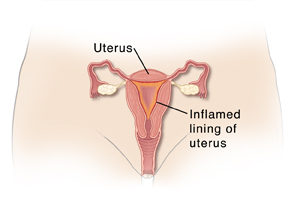Obstetric Endometritis
You have endometritis. This means the lining of the uterus is inflamed. It's usually caused by an infection.

These are common symptoms of endometritis:
-
Fever
-
Feeling ill
-
Pain in the lower belly (abdomen)
-
Abnormal bleeding from the vagina
-
Bad-smelling fluid from the vagina
-
Pain when urinating
-
Pain during sex
-
Headache
-
Fatigue
-
Loss of appetite
Endometritis can be caused by:
In some cases, an infection called pelvic inflammatory disease (PID) also happens. This affects the ovaries and fallopian tubes. If not treated, PID may lead to infertility. It can also lead to full-body infection (sepsis).
Home care
You may be given antibiotics to take for the infection. Your symptoms should get better within 2 to 3 days of starting the antibiotics. Take the antibiotics until they are used up. It’s important to finish the antibiotics even if you feel better. This is to make sure the infection has cleared up.
General care
You can take acetaminophen or ibuprofen for pain, unless you were given a different pain medicine to use. If you have chronic liver or kidney disease, talk with your healthcare provider before using these medicines. Also talk with your provider if you’ve had a stomach ulcer or digestive bleeding or are taking blood thinner medicine.
Follow-up care
Follow up with your healthcare provider, or as advised. You may need to have a procedure to clear tissue out of the uterus. This is called dilation and curettage (D&C). Your provider can tell you more about this.
Call 911
Call 911 if any of these occur:
-
Severe pain and very heavy bleeding
-
Severe lightheadedness, passing out, or fainting
-
Rapid heart rate
-
Trouble breathing
-
Confusion or difficulty waking up
When to seek medical advice
Call your healthcare provider right away if any of these occur:
-
Fever of 100.4°F (38°C) or higher, or as directed by your healthcare provider
-
Symptoms get worse
-
You have new symptoms
-
Nausea or vomiting
-
Your symptoms don’t improve within 3 days of starting treatment
Online Medical Reviewer:
Donna Freeborn PhD CNM FNP
Online Medical Reviewer:
Heather M Trevino BSN RNC
Online Medical Reviewer:
Irina Burd MD PhD
Date Last Reviewed:
6/1/2022
© 2000-2024 The StayWell Company, LLC. All rights reserved. This information is not intended as a substitute for professional medical care. Always follow your healthcare professional's instructions.